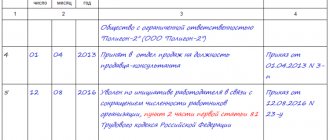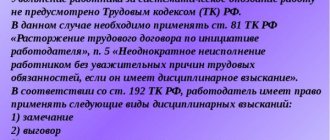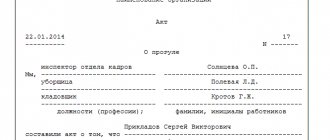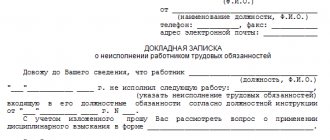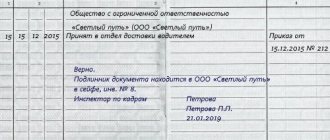Basic criteria for determining a one-time violation of duties
Important
The entire list of possible gross violations of labor discipline or labor duties, for which dismissal may be applied, is enshrined in clause 6 of Art. 81 Labor Code of the Russian Federation. The list of offenses listed in it that relate to gross violations is closed and exhaustive, not allowing the addition of new items to it (clause 38 of the Resolution of the Plenum of the Armed Forces of the Russian Federation dated March 17, 2004 No. 2).
Thus, when determining the admissibility of using termination of an employment contract as a punitive measure against an employee, it is imperative to compare the offense committed by him with the types of violations given in this article. Termination of employment relations at the request of the employer in cases other than those not included in the list of Art. 81 of the Labor Code of the Russian Federation, the legislation does not allow employee misconduct.
For your information
It is worth remembering that in order to exercise its right to terminate the employment relationship on its own initiative, the company must adhere to the general principles of bringing to punishment for disciplinary omissions (Part 3 of Article 192 of the Labor Code of the Russian Federation).
What actions are considered violations?
When hiring a new employee, the employer is obliged to conclude a written employment contract, which stipulates the rights and obligations of the parties, the validity period if the work is supposed to be temporary.
The list of official (professional) responsibilities can be specified in the content of the official agreement or drawn up in a separate document.
A newly hired employee must be familiarized with local legal acts relating to labor relations, for example:
- internal regulations;
- collective agreement;
- labor protection instructions;
- others.
By and large, the employee is required to:
- fulfill your obligations in full;
- comply with the established routine and rules for safe work;
- treat the employer's property with care and if, due to the specific nature of the activity, he is entrusted with valuable or personal belongings of third parties.
In addition to a number of responsibilities that an employer has to hired workers, he, due to the subordination of his position, has rights, including:
- reward subordinates for effective work;
- hold accountable;
- initiate termination of employment under certain circumstances.
The issue of correct application of labor legislation is very sensitive. We will separately focus on what the legislator classifies as a gross violation of labor discipline.
What violations serve as sufficient grounds for dismissal?
The list of personnel actions that the Labor Code of the Russian Federation classifies as gross misconduct includes:
- Absenteeism;
- Being drunk or under the influence of drugs at work;
- Failure to comply with state or commercial secrets;
- Theft on the premises of the tenant;
- Failure to follow labor safety rules, which led to negative consequences;
- Facts of immoral behavior of an employee engaged in educational work.
All of these facts may become sufficient grounds for termination of the employment contract with an employee at the initiative of the employer.
Truancy as a separate type of violation
Absenteeism in the text of the Labor Code of the Russian Federation means absence from the workplace for more than 4 hours in a row, or during a shift without the presence of any mitigating circumstances. However, it must be taken into account that the break time for meals and rest does not apply to working time, and therefore should not be taken into account when determining the total period of absence.
In particular, cases of absenteeism include an employee’s unauthorized departure on vacation without the consent of the employer, as well as if he has not started work to which he was transferred by order of the organization.
General information
If one of the employees of the enterprise has seriously violated the rules of labor discipline, then the employer has the right to decide to dismiss this person, since it considers it impossible to continue cooperation with him. In this case, the employer should be guided by the norm established by paragraph 6, part 1, article 81 of the Labor Code of the Russian Federation. According to this provision, the basis for termination of the contract is a one-time gross misconduct of the employee.
Such violations include:
- Absenteeism, that is, an employee is not at work for more than 4 hours during a shift.
- Showing up for work under the influence of drugs or alcohol.
- Theft. What responsibility the employee will bear for this offense is decided by the employer. If the amount of the theft in monetary terms does not exceed the average monthly salary of the employee, the employer may issue an order to withhold the amount of damage caused from the salary. If the enterprise’s losses exceed the amount of earnings, then the issue is resolved in court.
- Disclosure of classified information that the employee has undertaken to keep secret in accordance with the terms of the document he signed.
- Violation of labor protection rules, if this led to a threat to the health and life of other workers.
Each of these offenses can be considered grounds for dismissing a person. But the degree of guilt of a specialist should be considered strictly individually.
Being intoxicated at work
Cases of dismissal due to reporting to the workplace and performing one’s duties while under the influence of alcohol or drugs are not uncommon. In this case, the fact that the employee is removed from performing work for the subsequent termination of the contract does not play any role. In addition to being in the workplace, being in a state of intoxication on the employer’s premises is also considered a violation.
Important
Being under the influence of alcohol or illegal drugs should be confirmed by a medical report or other possible evidence, which, if necessary, can be accepted by the court for consideration in the event of disputes.
Disclosure of classified information
Some positions require familiarization with documents containing information about state secrets. Such employees are required to sign a non-disclosure agreement regarding information they learn in the workplace. When a manager suspects that a specialist is violating these requirements, he must initiate an independent audit. If its results confirm the fact of disclosure, then the employer must issue an order to immediately remove the employee from performance of official duties.
In addition to state secret information, there are trade secrets, as well as confidential information. Each specialist who has access to them due to work duties enters into a non-disclosure agreement with the employer on the information received. If the manager has reasons to believe that secret information has become known to third parties, then an investigation into this fact must be conducted.
Upon receipt of evidence of disclosure, the employer must decide whether to punish the employee. The legislation allows both the issuance of a reprimand and the termination of the contract with the entry of a dismissal record into the work book under Article 81, paragraph 6.
Violation of state and commercial secrets
To dismiss for disclosing secret commercial or government information, the employer must prove that it was available to the employee due to the performance of his official duties, and he knew about its secrecy and the inadmissibility of dissemination, which he was warned about in writing.
For your information
If an employee accidentally learned some data that does not relate to his duties and came to him by accident, then it most likely will not be possible to fire him on the specified grounds.
Time limits for dismissal
The mere fact of a gross violation of discipline does not predispose the authorities to show patience with the offender. Therefore, dismissal as a disciplinary measure is not long in coming. But if the situation requires consideration or investigation, then the employer must remember that the law gives him only thirty days from the moment the offense was discovered, Art. 193 Labor Code of the Russian Federation. This means that management will not be able to threaten dismissal and keep the employee in constant tension. The law insists: either a proportionate punishment within a month, or complete forgiveness of the offense.
Those employees who plan to hide from the wrath of management on vacation or on sick leave should know that these periods are excluded from the period allotted for making a decision on the fate of the negligent employee, Art. 193 Labor Code of the Russian Federation. That is why, after a sudden exacerbation of chronic illnesses, no matter how long it lasts, the hired person will have to give written explanations about the reasons for his behavior.
There is one more restriction: you cannot punish for a violation that is discovered six months after it was committed. This period is extended only for those events that can only be discovered through an audit or through the involvement of auditors. Then the collection may occur two years later.
Dismissal for theft at work
This type of penalty can only be applied to persons whose commission of guilty actions in the workplace is confirmed by a court decision that has entered into force. In this case, the employee may be held liable for theft from the employer, another employee or another person who was on the territory of the organization.
Important
To apply such a punishment, the employer has a month from the date of entry into force of the relevant legal court decision. Similar requirements apply to cases of intentional embezzlement committed by an employee.
Dismissal procedure
Any violation must be considered on its merits, taking into account all mitigating and exculpatory circumstances. Article 192 of the Labor Code of the Russian Federation calls the employer to do this. If the employee’s guilt is undeniable and management is not inclined to stand on ceremony with the offender, personnel officers will have to go through the difficult formal path of preparing documents for dismissal for failure to comply with labor discipline. And in order not to replenish the archive of judicial practice in favor of the employee, you must not skip a single step.
Certification of the fact of violation
Recording an offense is the starting point for applying any disciplinary sanction. The employer’s confidence that the employee will not be able to challenge the legality of dismissal for violation of labor discipline depends on how completely and objectively the procedure is carried out:
| Type of violation | Fixation method | Employee's counterarguments |
| Absenteeism or absence from work for more than 4 hours | An absence from work certificate signed by at least two witnesses. It must be taken into account that the people who signed must have the opportunity to personally verify the person’s failure to appear or constant absence from the workplace. | The most common shield for an employee is a certificate of sudden illness or sick leave. In the first case, the absence will not be paid, but dismissal can be avoided. Any document confirming the unforeseenness and urgency of personal circumstances will also help justify the case. |
| Late | The same act, but for dismissal there must be several of them. You need to understand that management will not be able to kick an employee out for systematic tardiness without additional evidence. | The reasons for being late can be very different, but the employee must provide a convincing explanation for each of them. A broken lock, a malfunctioning elevator, an illness in a pet, or a burst pipe can evoke sympathy from your boss. At the same time, regular late appearance at work for any reason is a direct way out. |
| Refusal to comply with labor safety rules | A memo from the responsible employee or an accident report at the enterprise | The employee must report the impossibility of work and a threat to health to the supervisor before starting work. If this was the result of management shortcomings, then the dismissal of the employee is considered illegal, Art. 220 Labor Code of the Russian Federation. |
| Theft or damage to property | A written statement to the police, independent recording of the fact of damage with the involvement of witnesses and further internal investigation | An employee will be able to protect himself not only from dismissal, but also from the obligation to reimburse material costs, if he proves that the valuables were not transferred to him for safekeeping legally. The absence of a financial liability agreement signed by the employee will also help. |
| Appearing in a state of any kind of intoxication | A report from the immediate superior and a medical examination or a written refusal to visit the hospital. | Stubborn refusal to draw up or sign any documents will work against the employee. The management will simply draw up a notice of refusal and lawfully dismiss the employee. If the cloudy state is not related to the use of strong drinks, it is necessary to prove that the inadequacy of the reaction arose as a result of a sharp deterioration in health. |
Real life situations can go far beyond the standard options. The main thing when preparing documents is objectivity, as well as the involvement of disinterested witnesses and experts.
Issuing a warning to an employee
Even if the situation is interpreted unambiguously and, in the employer’s opinion, the employee deserves the most severe punishment, it will not be possible to apply it without an explanation from the employee. The law obliges the employer to request them from the offender in writing, Art. 193 Labor Code of the Russian Federation.
There is a generally accepted form asking the employee to prove his innocence, but you can make your own changes to it if this applies to what happened. If the employee refuses to receive the request, then it must be read out loud and the refusal must be confirmed by the signatures of witnesses. Or formalize this fact in a separate act.
Preparation and receipt of an explanatory note
The employee is given two working days to substantiate the unintentionality of his actions or prove the occurrence of insurmountable circumstances. During this time, he can obtain the necessary certificates, seek advice from a lawyer, or simply state the reasons for his behavior.
Often the employer demands urgent writing of an explanatory note or threatens immediate dismissal. In this case, the employee should not rush or be afraid: the management is not able to influence the deadlines. But in order for management not to succumb to the temptation of quick reprisal, the employee must receive a copy of the demand against his signature, and when handing over the explanatory note to the director, make him sign on the second copy.
Consideration and assessment of the fact of violation
Since dismissal for failure to comply with labor discipline is an extreme measure, decision-making often occurs collectively. It would be better if the boss’s conclusions were confirmed by members of a specially created commission. If an employee is a member of a trade union, then taking their opinion into account is also indispensable.
Individual adoption of radical measures threatens the employer with inspections by labor inspectors, the prosecutor's office, and, in the worst case, a court decision not in his favor.
Order of dismissal for violation of labor discipline
The final act, in an unfavorably developing situation, will be an order of dismissal. You can take the unified T8 form as a sample. The only difference from the standard order to terminate an employment contract will be the basis for the calculation - the mention of one of the paragraphs of Article 81 of the Labor Code of the Russian Federation.
Violation of labor safety rules
Prosecution for non-compliance with safety regulations and labor protection requirements is possible only if this fact led to an accident, injury at work, or created a real danger for such events at the enterprise.
In this case, the employee is obliged to adhere to labor protection rules on the basis of Art. 217 Labor Code of the Russian Federation. The violation must be recorded by the commission and confirmed by an act or an expert opinion signed by all members of the commission.
What disciplinary offense can lead to dismissal from work?
The desire to certainly punish the guilty employee should not prevail over a sober assessment of the severity of the offense and its consequences. Termination of a contract with a hired person is the extreme and most severe disciplinary measure, and therefore it can be used only in relation to persistent violators and gross violations.
Quick dismissal is possible only for a single gross deviation from the provisions of the employment contract and local regulations of the enterprise (without justifying circumstances). To break up due to minor but systematic misconduct, you need to document at least two facts . But even in this case, it is not worth kicking out an employee for a couple of minor delays, since the court may perceive such a measure as excessive and require the employee to be reinstated.
In addition to special circumstances, there is also a legislative norm prohibiting pregnant women and young mothers with children under 3 years of age from being subject to disciplinary liability more severe than a reprimand, Art. 261 TK.
Rough
Conventionally, employee misconduct can be divided into several subtypes.
Options for gross violations, when dismissal is possible even for 1 fact:
- Missing the entire shift;
- Absence from the work site for more than 4 hours;
- Consumption of alcohol on the employer's premises;
- Confirmed state of intoxication in the workplace (alcohol, toxic, narcotic);
- Ignoring labor safety rules if this resulted in misfortune or a clear threat to team members.
However, if sufficient evidence has not been collected, the employee refused a medical examination, or the case is not recorded on paper, then it is better to limit yourself to an oral remark. Any written reprimand in such a situation can be successfully challenged.
Violations of routine and labor discipline
Less severe, but systematic shortcomings in work, when dismissal threatens only 2 or more cases:
- Being late;
- Unreasonable absences (short);
- Failure to comply with work schedule;
- Ignoring the rules of official safety (without damage).
It is almost impossible to fire employees with irregular schedules or traveling nature of work for violating the work and rest schedule.
Violation of employment agreement and job description
If the employer has complaints regarding non-performance, poor quality performance or refusal to perform job functions, then violations that allow a specialist to be considered as a candidate for employment include:
- Sabotage (deliberate and destructive behavior aimed at disrupting work);
- Refusal to comply with lawful orders and instructions from superiors;
- Failure to meet production standards or delays in meeting deadlines;
- Poor quality work or defects due to the fault of the employee;
- Avoidance of mandatory medical examination;
- Violation of other provisions of the employment contract.
For each such incident, the employee faces a punishment no more severe than a reprimand. However, for the second instance of such behavior, the specialist can quite reasonably expect a reckoning. The same result should be feared if the violator’s asset remains an outstanding penalty (even a reprimand) within the previous 365 days, Art. 192 TK.
The employee’s guilt and the absence of force majeure are the main conditions for applying disciplinary punishment. However, the employer must remember that changes in the employee’s duties must be notified in writing 60 days before they occur, Art. 74 TK. Without such a warning, a reprimand, much less dismissal, will be considered illegal.
Failure to comply with labor protection requirements
Depending on the danger of production or individual professions, the employer must conduct (under signature) introductory and regular briefings for personnel. Violation of these norms or unauthorized refusal to use preventive and protective measures is considered a misdemeanor, even if this does not result in serious consequences or damage to health.
If the employee’s behavior did not create a danger to his own person or the health of his colleagues, then the most severe punishment for him is a reprimand. It is possible to save the team from potential danger only if disciplinary punishment has already been applied to this employee, Art. 193 TK.
You cannot dismiss a specialist who refuses to perform his duties if he sees that labor protection or safety is not ensured, Art. 379 TK. If the employee knew about the danger and nevertheless started work, then this will not be a mitigating circumstance.
Damage to the company
Harm to the employer does not always relate exclusively to the loss of material assets. The blows to reputation are no less noticeable. Based on this, an employee can cause damage to the employer if:
- Discloses commercially sensitive data or state secrets (if admitted to them under signature);
- Allowed theft or embezzlement of material assets;
- Caused intentional harm.
Any of the violations is gross, therefore, if guilt is established, the employer can immediately fire the pest. And yet, before terminating the contract, it is necessary to conduct an independent investigation or involve law enforcement officers. You cannot be accused of embezzlement or disclosure if valuables or secrets were not officially transferred.
The law prohibits the imposition of two penalties for one offense , so it is impossible to issue an order for prosecution and then an order for dismissal for the same reasons. The court will consider such registration a repeated recovery, Art. 193 TK.
The sequence of dismissal for a single gross violation of labor duties
Before starting the dismissal procedure, it is necessary that there be a basis for this. If a violation is detected, the person who discovered it draws up a report or otherwise informs the manager and the personnel service about it. As a result, the company should receive a document that subsequently serves as evidence of the commission of an offense:
- An act of the commission recording the fact of absence - due to truancy;
- Medical certificate confirming the fact of intoxication;
- An act of the results of an internal investigation following the disclosure of a trade secret or the discovery of a gross violation of safety regulations;
- Court verdict in a case of theft or embezzlement.
After receiving these documents, the employer must adhere to the rules for applying disciplinary sanctions contained in Art. 193 Labor Code of the Russian Federation. In case of absenteeism, violation of labor safety requirements or the fact of intoxication, an explanation must be requested from the employee, for which he is given 2 days.
For your information
Lack of explanations is not a basis for refusal to apply punishment.
Based on one of the above documents, the employer issues an order to impose a disciplinary sanction in the form of dismissal. At the same time, some experts, relying on Letter of Rostrud dated June 1, 2011 N 1493-6-1, indicate that the issuance of two orders: on the application of a disciplinary sanction and on dismissal will also not be a violation of the law. The Labor Code of the Russian Federation does not contain any clarification on this issue.
Information
Orders can be issued in a independently developed form or using the T-8 form.
The date of termination of the employment contract specified in the order and work book becomes the employee’s last working day.
For your information
An employment contract cannot be terminated with an employee during a period of incapacity for work or while on vacation. In addition, certain categories of workers are not subject to dismissal at the initiative of the employer, in particular pregnant women, women with children under 3 years of age, and single mothers.
On the day of dismissal, the employee is issued a work book, as well as a certificate of average earnings; upon his application, he may be issued other documents about his work activity.
What is labor discipline?
For example, employee Ivanov. A.A. violated work regulations by showing up for work an hour later than scheduled without a valid reason. In this case, the employer may limit himself to a verbal warning, which is issued in the form of an act of disciplinary violation
.
In case of systematic delays, Ivanov A.A. a reprimand may be issued
, but the law does not allow a reprimand to be issued immediately after the first offense.
Types of disciplinary sanctions and their application
Disciplinary sanctions are aimed at improving the quality and organization of work. Based on the employment contract, employees are obliged to strictly comply with all regulations, since in case of violation of labor discipline in accordance with the Labor Code of the Russian Federation, penalties regulated by law may be imposed on the employee.
As stated earlier, in case of minor violations, the employee may remain at his job. The fact is that dismissal is not the only method of punishment and is considered its highest measure.
- crimes committed within the enterprise;
- causing property damage to the company;
- being intoxicated at work;
- one-time or systematic violation of the terms of the employment contract;
- disclosure of trade secrets;
- indecent behavior during work;
- absenteeism or absence for more than three consecutive hours during working hours.
Law
If there is a gross violation, dismissal should be immediate. In this case, the employer has the right to terminate the contract urgently. This means that an employee can be fired without working.
Failure to comply with labor regulations by hired personnel in specific terms entails disciplinary violations, including:
Filling out a work book upon dismissal for violation
Reflection of the fact of termination of the employment contract in the book will depend on the grounds that served as the reason for parting with the employee. In column 1 the serial number of the entry is entered, in column 2 the date of its entry is indicated. The general scheme for entering information about dismissal in column 3 can be presented as follows:
- “Dismissed for “reason stated” subp. “subparagraph” of clause 6 of Art. is indicated. 81 Labor Code of the Russian Federation"
- “The employment contract was terminated for “reason given” subclause “reference to subclause” of clause 6 of Art. 81 Labor Code of the Russian Federation."
Both options will be correct and not contrary to current legislation. Column 4 provides the number and date of the order on the basis of which the entry was made. The person who entered the information about the dismissal in the work book also signs and deciphers it.
What is the procedure for dismissal for disciplinary action?
The employer’s step-by-step algorithm of actions does not greatly depend on the form of violation of discipline and labor duties. It is mandatory to:
- Identify the fact of misconduct and document all the circumstances (in the form of an act, a collation sheet, an inventory or an accounting record). If necessary, issue a referral for drug testing.
- Request an explanation from the employee. They do this in person if the employee is at work, or send it by mail if the person does not show up for work.
- Wait 2 business days, not counting the day the request was announced. If it was sent by letter, then the countdown of the waiting period begins from the day the item is actually delivered to the addressee.
- Individually or with the involvement of a working commission, make a decision on the validity of the circumstances set out by the employee in the explanatory note. Assess the degree of their influence on the situation and the specialist’s guilt, as well as his motives.
- Based on these findings, issue an order to impose the selected type of penalty; the available options are listed in Art. 192 TK. Under signature, familiarize the employee with it or attest to his refusal.
- If earlier, within 365 days before the case in question, the employee had already received penalties, then it is permissible to immediately issue a dismissal order.
- Give your former colleague a work book and pay slips, a copy of the order and a certificate of income.
If not all the evidence has been collected, or the employee refused a medical examination , then it is better not to rush into making angry entries in the employee’s book. The best option would be to try to resolve the issue peacefully and part ways with the negligent employee by agreement, Art. 78 TK.
Contents of the order and date of termination of the contract
Own forms of personnel documentation can be approved for each organization, Art. 8 TK. However, most enterprises use unified forms recommended by the State Statistics Committee in Resolution No. 1 of 2003. To formalize disciplinary punishment in the form of dismissal, use the T-8 form.
Such an order must contain:
- details of the enterprise and personal data of the employee;
- reason for the settlement (“disciplinary dismissal based on ...”)
- link to subparagraph of Art. 81 TK;
- list of supporting documents (acts, certificates, explanatory notes, court decisions, etc.);
- signatures of management and employee.
Regardless of the date of commission of the offense, the date of termination of cooperation with a specialist cannot occur before receiving the relevant conclusions, explanations or a court verdict. An employee cannot be dismissed until the end of the proceedings , and only in some cases is removal from a position without saving wages allowed, Art. 76 TK. As an alternative, you can offer the employee a temporary transfer to another location.
Entry in the work book
The employer is obliged to return the individual book about the experience accumulated over a lifetime to the owner of the document no later than the day following the dismissal; the procedure is described in Art. 84.1 TK. If an employee had to be fired for absenteeism without his presence, then you need to send him a letter within the same time frame with an offer to pick up the work record or keep it for 50 years, as a document of “eternal” storage, Art. 22.1. Law 125-FZ.
The labor report itself will state the reason for the dismissal, the date of the event and a reference to the Labor Code of the Russian Federation (subparagraph of Article 81 of the Labor Code will depend on the type of misconduct).
Sample note of dismissal for systematic failure to perform a job function
Are there statutes of limitations?
A flagrant misconduct by an employee or systematic violations of discipline cannot become the basis for long-term blackmail on the part of the employer. If management believes that the only correct decision in the current situation is dismissal, then you need to exercise your right within:
- 30 days from the date when the incident was reported to the immediate superior, even if he is deprived of the right to impose penalties;
- six months from the date of the violation, if this did not become known immediately;
- 24 months from the date of commission of the offense, to detect which an audit must be carried out.
The statute of limitations is extended for periods of vacation, illness and criminal investigation. Time off and rest time between shifts do not affect the length of the period.
List of payments to a dismissed person for guilty actions
Upon termination of an employment contract, the employer is obliged to make a full settlement with the employee on his last working day (Article 140 of the Labor Code of the Russian Federation). In the event of termination of employment, the employee is entitled to:
- Payment for the period actually worked in the month of dismissal;
- Cash compensation for vacation days not taken by the dismissed person (Article 127 of the Labor Code of the Russian Federation).
If the employee did not go to work on the day of dismissal, the company is obliged to make a payment no later than the next day after the date of the employee’s request. If a dispute arises over the amount of payment, the organization is obliged to pay out the undisputed part of the amount.
What guaranteed payments are due after dismissal?
The reason for the calculation cannot influence the list of payments due upon dismissal. On the day of separation, the employer is obliged to issue:
- salary for less than a month of work;
- compensation for the remainder of the vacation;
- debt/overexpenditure on accountable amounts or reimbursement of expenses.
When paying settlements, it is permissible to withhold the cost of damage established and agreed upon with the employee. If the employee does not agree with the amount, then the management will have to go to court and compensate for what was lost through enforcement proceedings, Art. 137 TK.
The law does not provide for the payment of severance pay to employees dismissed for culpable reasons, and also reduces the period for receiving unemployment benefits to 3 months, Art. 31 of Law 1032-1.
Possibilities for challenging dismissal at the initiative of the employer
In case of non-compliance with the provisions of Art. 193 of the Labor Code of the Russian Federation, as well as insufficient documentary justification for termination of the employment contract, it can be challenged by the former employee in court. If conflicts arise, the responsibility to prove the legality of termination of employment relations lies entirely with the employer (clause 23 of the Resolution of the Plenum of the Armed Forces of the Russian Federation dated March 17, 2004 No. 2).
In addition, we must not forget that dismissal for a single violation is a disciplinary measure and when carrying it out, you should pay attention to the following facts:
- Mandatory presence of evidence of an offense;
- Proof of the employee’s obligation to comply with a particular requirement;
- Availability of documents proving compliance with the dismissal procedure;
- Compliance with deadlines for bringing to justice.
In most cases, when challenging dismissal for gross violation of labor duties, employees refer to violation of the dismissal procedure or incorrect documentation. In any case, the employee has a month from the date of delivery of the order to terminate the employment contract against signature to go to court to challenge the dismissal.
What is a violation of discipline
Disciplinary offenses inevitably entail disciplinary action, but is everything that the employer does not like considered a violation of discipline? When does management have the right to decide to hold an employee accountable and punish the employee, and when is this not allowed?
What is labor discipline
As for the option of depriving a bonus as an edifying measure: bonuses, in accordance with the Labor Code of the Russian Federation, are an incentive payment and not a penalty measure. But if the enterprise has a bonus system, then the regulations on bonuses provide for which the employee’s bonus is reduced or not paid in full. One of these conditions is failure to fulfill duties. In this case, the local act on bonuses must establish the conditions and procedure, including documentation, in accordance with which the amount of the bonus is reduced or the employee is deprived of the bonus completely.
The current legislation, by its rules, has established a ban on layoffs of certain categories of workers. Moreover, the position held or work experience does not matter. In certain cases, dismissal of an employee will be illegal:
- full name of the enterprise, information about the manager - who is being addressed;
- information about the compiler - full name, position, department;
- title of the document “explanatory”;
- what the offense was expressed in - time, place, actions, reasons;
- admission or denial of guilt;
- number;
- painting.
Order of dismissal
Before dismissing an employee for failure to fulfill official duties, the manager accepts a written explanation from him. If the culprit refuses, then the action is recorded in a specially created act.
Internal regulations are approved at each enterprise. This document is considered a kind of instruction for employees, which spells out all the features of the work procedure - from the number of working hours to the procedure for calculating bonuses or disciplinary sanctions. Employees often violate these rules. What are the consequences of non-compliance with labor regulations for employees and are the employer’s actions legal in cases where violations are recorded?

